The Genron NPO marked the 18th anniversary of its founding on November 19, 2019 with the Tokyo Conference on Democracy 2019 Forum. It was held in two sessions, and the theme for Session 1 of the forum asked the participating panelists to consider what sorts of reform are needed in representative democracy today to reverse the global decline in public trust. The Genron NPO President Yasushi Kudo served as moderator for the session, and launched the discussion by asking the panelists, all from different countries, the following question.
"Why is left-wing and right-wing populism on the rise worldwide, and why are established political parties declining alongside public trust in the governing framework?"
Factors behind democratic instability
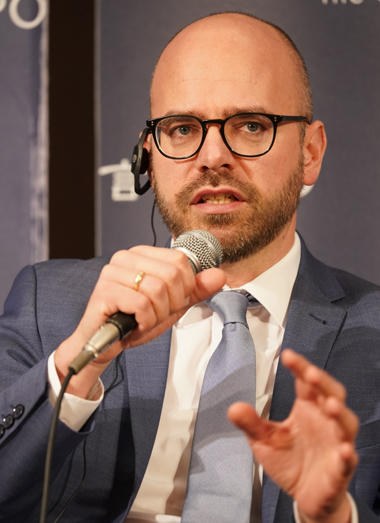 Josef Lentsch is one of the co-founders of a new Austrian political party called NEOS, Das Neue Österreich und Liberales Forum or New Austria and Liberal Forum. He explained that his reasons for getting involved were the issues inherent to political parties themselves.
Josef Lentsch is one of the co-founders of a new Austrian political party called NEOS, Das Neue Österreich und Liberales Forum or New Austria and Liberal Forum. He explained that his reasons for getting involved were the issues inherent to political parties themselves.
Lentsch believes that the established political parties are ignoring the changing political landscape as they simply play a game of power amongst themselves. However, people are looking for actual policy changes and innovation. The very fact that existing parties have stopped listening to the voices of the people is part of the reason people have stopped trusting them, he believes. Meanwhile, the emerging populist parties are taking advantage of this situation and gaining more political power, but are pushing their own agendas, which differ from what the citizens want, and this leads to a vicious circle of increasing lack of trust in politics/government.
Lentsch reported that parties like his own are appearing throughout Europe, parties he describes as "political start-ups," neither traditional nor populist, and they have begun to take up the new challenge of bringing citizens into politics. One example of such a party is France's La République En Marche!, which is led by French President Emmanuel Macron. He also noted that established parties are being spurred on by the emergence of the political start-ups to start implementing reform within their own parties.
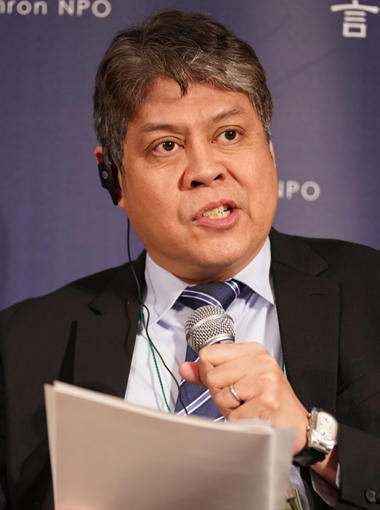 Francis Pangilinan serves as President of the Liberal Party of the Philippines, and he described the 2016 presidential race, when his own party lost. He explained that for six years under former President Benigno Aquino, the economy of the Philippines saw unprecedented growth, a reduction in poverty, and a rise in the stock markets. This is why it was thought that the Liberal Party would win the 2016 elections as well, but in the end, they lost to the current president, Rodrigo Duterte. Pangilinan pointed out that digital media played an important role in that result, with Duterte's faction obtaining information about as many as 1.5 million social media accounts, and he suggested that this election served as a sort of experiment chamber for the referendum on the U.K.'s exit from the European Union and the U.S. presidential election, both of which were held that same year.
Francis Pangilinan serves as President of the Liberal Party of the Philippines, and he described the 2016 presidential race, when his own party lost. He explained that for six years under former President Benigno Aquino, the economy of the Philippines saw unprecedented growth, a reduction in poverty, and a rise in the stock markets. This is why it was thought that the Liberal Party would win the 2016 elections as well, but in the end, they lost to the current president, Rodrigo Duterte. Pangilinan pointed out that digital media played an important role in that result, with Duterte's faction obtaining information about as many as 1.5 million social media accounts, and he suggested that this election served as a sort of experiment chamber for the referendum on the U.K.'s exit from the European Union and the U.S. presidential election, both of which were held that same year.
After winning, the Duterte government started what could be called reign of terror using social media to increase social fragmentation and engender greater animosity, attacking influential politicians in opposition parties in false news stories, killing drug addicts, and suppressing the independent media.
Alexander Görlach spoke from his perspective as a researcher, saying that the foundation of liberal democracy is supported by the principle of human rights delineated through the legal framework. Rights given through that framework consist of civil rights, such as freedom of political participation and freedom of speech, and social rights, which guarantee a minimum standard of living and level of education. Görlach believes it is important to maintain a balance of both types when protecting human rights.
Regarding the declining trust in democracy, Görlach looked towards economic structure as one factor. Over the previous 25 years, GDPs have grown in countries that are liberal democracies, however, in those same countries, income per household is decreasing and the number of poor is increasing. Görlach believes it is necessary to change societal structure in order to protect social rights for those people whose futures are dim, in order to give them the opportunity to improve their own lives, and that is why the core of the crisis lies in people exercising their civil rights. Following this, he called the gathering support for the movement catering to civic unease "illiberal democracy," a movement defined by its leaders' insistence on withdrawing from the international order to resolve domestic economic issues.
The three aspects of the democratic crisis: actors, conditions, and environment
Yoshida summarized the aspects of the democratic crisis raised by the panelists as three different concepts: Lentsch's proposed solutions to the degradation of political parties, i.e. the democratic "actors"; Görlach's view that human rights guarantees are under trial by fire by illiberal democracies, i.e. "environment"; and finally, the "conditions" under which democracy functions are changing through increasing digitalization of discourse, the aspect raised by Pangilinan.
After pointing out some of the structural factors underlying these three aspects of the crisis, Yoshida noted that the opinion polls conducted by Genron NPO and its partner think tanks in other countries have shown a common trend of citizens being unable to put their trust into the political parties, politicians, and national governing bodies that make up the fundamental structure of democracy.
"Is this opposition to the concept of representative democracy itself?" Yoshida asked the panelists. "Or is it a demand for representative democracy to be updated as something new?"
Lentsch and Pangilinan responded to Yoshida's question in similar ways, based on their own experiences, asserting that citizens want to be involved in resolving issues, and it is the responsibility of political leaders to make use of that intention in the political process.
Görlach expressed his perspective that it is not necessarily the framework of the representative democratic itself that is in crisis.
"The populists are going to have to explain the costs of their own political policies soon," he said. "In addition, voter turnout is rising in Europe, and while there is still polarization among the people, the process of selecting a representative through voting is protected."
In addition, Görlach also gave his perspective of someone researching the relationship between digital technologies and democracy. While some believe technology can be used to realize the goal of truly impartial governance, there is a greater fear that politicians' own biases will cause them to utilize such data in a prejudiced ways.
A prerequisite of "exhaustive dialogue" - the institutionalization of empathy
At this point in the discussion, Genron President Yasushi Kudo pointed out other aspects that were uncovered through the opinion polls conducted in each country and asked the panelists another question.
"We found divisions in political awareness based on factors such as income and age, and this structure was entrenched by technology," he said. "Under these conditions, how can democracy be made to function?"
Josef Lentsch looked at factors surrounding the U.K. withdrawal from the E.U., and suggested that the structure of the national referendum being a simple choice of "agree" or "disagree" had an influence. For large, complex issues with major consequences, Lentsch stated that it is necessary to create a framework for people to engage in long-term, repeated discussions.
Pangilinan actually tackled the issue of "exhaustive dialogue" in the Philippines, and he spoke about the results of his work. Through opinion polls conducted by his own party, they were able to encourage direct dialogue among the people, which led to them having a deeper understanding of each other. This has resulted in a decline in the sort of behavior that leads to threats and animosity seen in social media.
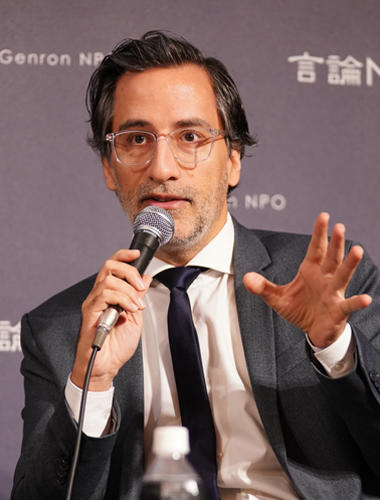 Görlach described how one German newspaper has begun pairing up people with differing political attitudes, i.e. right wing and left wing, and having them engage in dialogue, and he reported that people are becoming more able to open their minds to the ideas of others. He stated that what is needed for people to engage in truly exhaustive discussions with each other is empathy and the ability to look at things from other people's perspectives, therefore the issue now is to determine how to build a concrete system that will incorporate empathy into the democratic process.
Görlach described how one German newspaper has begun pairing up people with differing political attitudes, i.e. right wing and left wing, and having them engage in dialogue, and he reported that people are becoming more able to open their minds to the ideas of others. He stated that what is needed for people to engage in truly exhaustive discussions with each other is empathy and the ability to look at things from other people's perspectives, therefore the issue now is to determine how to build a concrete system that will incorporate empathy into the democratic process.
The global movement towards revitalized social capital and regional development
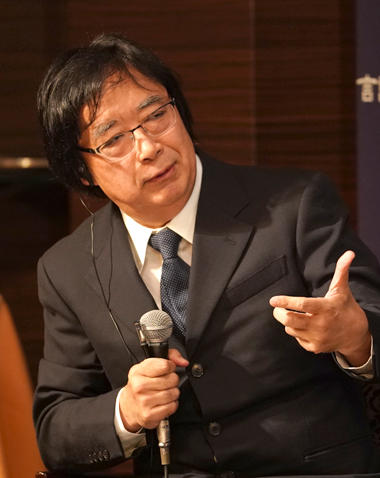 Kudo summarized the previous discussion, saying that the panelists seemed to be asserting that many citizens want to be involved in the problem resolution process. He then asked a question on how Japan can handle this issue.
Kudo summarized the previous discussion, saying that the panelists seemed to be asserting that many citizens want to be involved in the problem resolution process. He then asked a question on how Japan can handle this issue.
"The Genron NPO was literally founded in order to create a means for the citizens of Japan to independently approach the issues we face as a country, but we haven't reached that point yet. What do we need to do here in Japan to revitalize representative democracy?" he asked.
Lentsch suggested that since macro political change takes time, perhaps the effort could be directed towards encouraging civic participation on the local government level. He described a movement in Germany through which non-government organizations gather together citizens with different points of view to make proposals to local mayors, a movement that has gained the support of the organizers of opinion polls, funds and other institutions.
The issue in Japan - encouraging engagement among the politically indifferent
Yoshida addressed the issue of how to promote political participation among citizens indifferent to the process by looking to examples in Europe and the U.S.
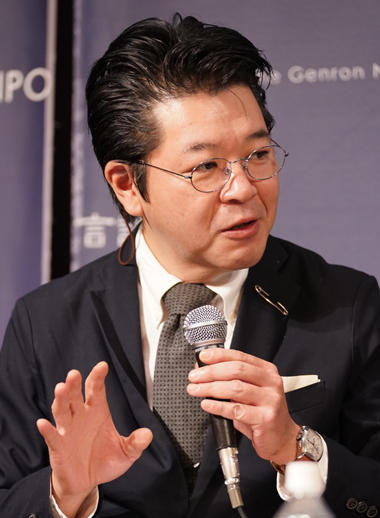 "The distrust of democracy in Europe and the U.S. has been influenced by people's excessively strong political awareness, but Japan is different in that distrust has arisen from people feeling distant from the political process," Yoshida suggested.
"The distrust of democracy in Europe and the U.S. has been influenced by people's excessively strong political awareness, but Japan is different in that distrust has arisen from people feeling distant from the political process," Yoshida suggested.
He went on to say that in Japan, there is the fear that populist influence will spread among these politically disinterested citizens and extend to how they vote, and solving the issue of how to ensure citizens feel more engaged in a so-called "proper" way will lead to a stronger democracy. Yoshida laid out numerous proposals on how to achieve this, including revising the excessive election campaign regulations in the Public Offices Election Act, lowering the voting age, improving leave of absence programs such that people with regular jobs can become candidates, designing a partial lottery system to select legislators in regional government assemblies, and a system through which citizens can be involved in discussions reviewing how some taxes are apportioned.
"There is still a lot of room for innovation in Japanese democracy through systematic reform," he emphasized.
Ideas must be shared internationally for democracy to prosper
Near the end of Session 1, Kudo elicited final opinions from each of the panelists, but one point they agreed on was that international cooperation among people who share democratic values is necessary.
Alexander Görlach stated that the E.U. was initially established when the member nations had the shared threat of Russia looming over them, but now is the time for the E.U. to go back to basics.
Pangilinan noted that his own political party has an advisor who also works with President Macron. In order to ensure that democracy continues to exist, but more than that, that it continues to prosper, Pangilinan believes that this sort of transborder idea sharing is needed.
Josef Lentsch pointed to Swedish environmental activist Greta Thunberg as an example of the global search for "good practices" that will lead to democratic reform.
Yoshida looked to the contribution Japan and the E.U. are making in promoting common values, such as the rule of democracy and human rights, through the Economic Partnership Agreement signed last year. He particularly emphasized that Japan and Germany, one of the E.U.'s major powers, have actually been ruled by fascist governments and that their histories clearly illustrate the importance of promoting such values. Thus, as "illiberal democracies" emerge throughout the world, Japan and Europe have the opportunity to serve as a bulwark for liberal democracy.
Finally, Kudo summarized the two hours of discussion, stating that he was encouraged by the panelists' continued belief in the power of the people. He also noted that Genron will begin discussions into the idea that the system can be redesigned by going back to the basic principles of democracy, i.e. having the ability to be empathetic towards others and view things from other perspectives.
With that, Session 1 of The Tokyo Conference on Democracy 2019 Forum came to a close.
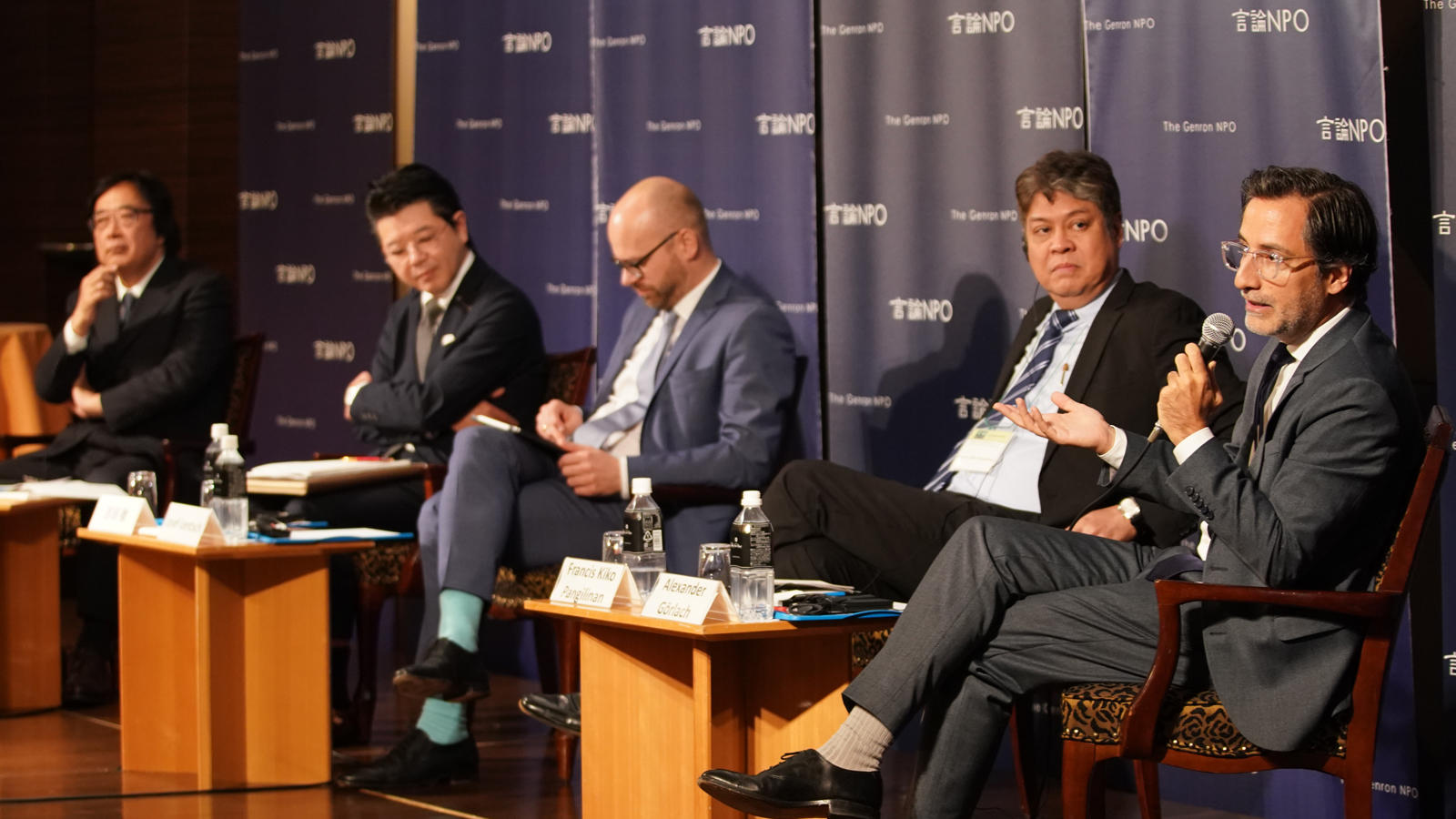
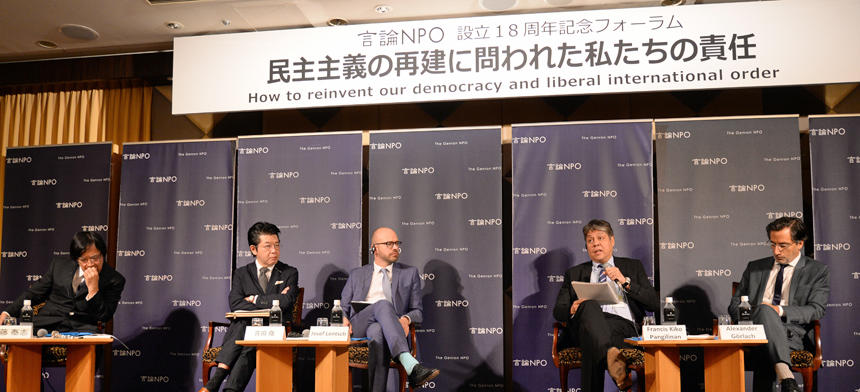

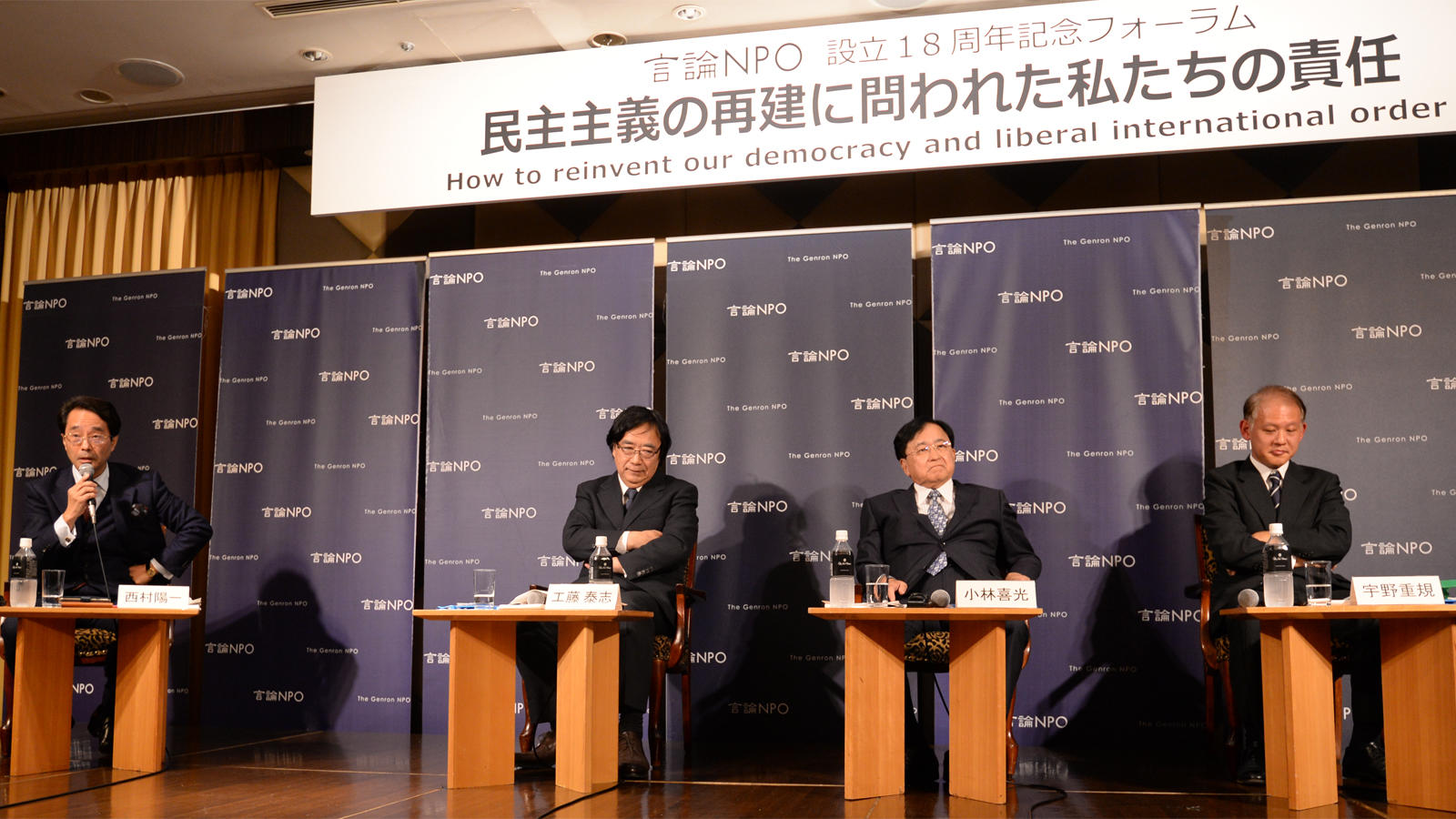
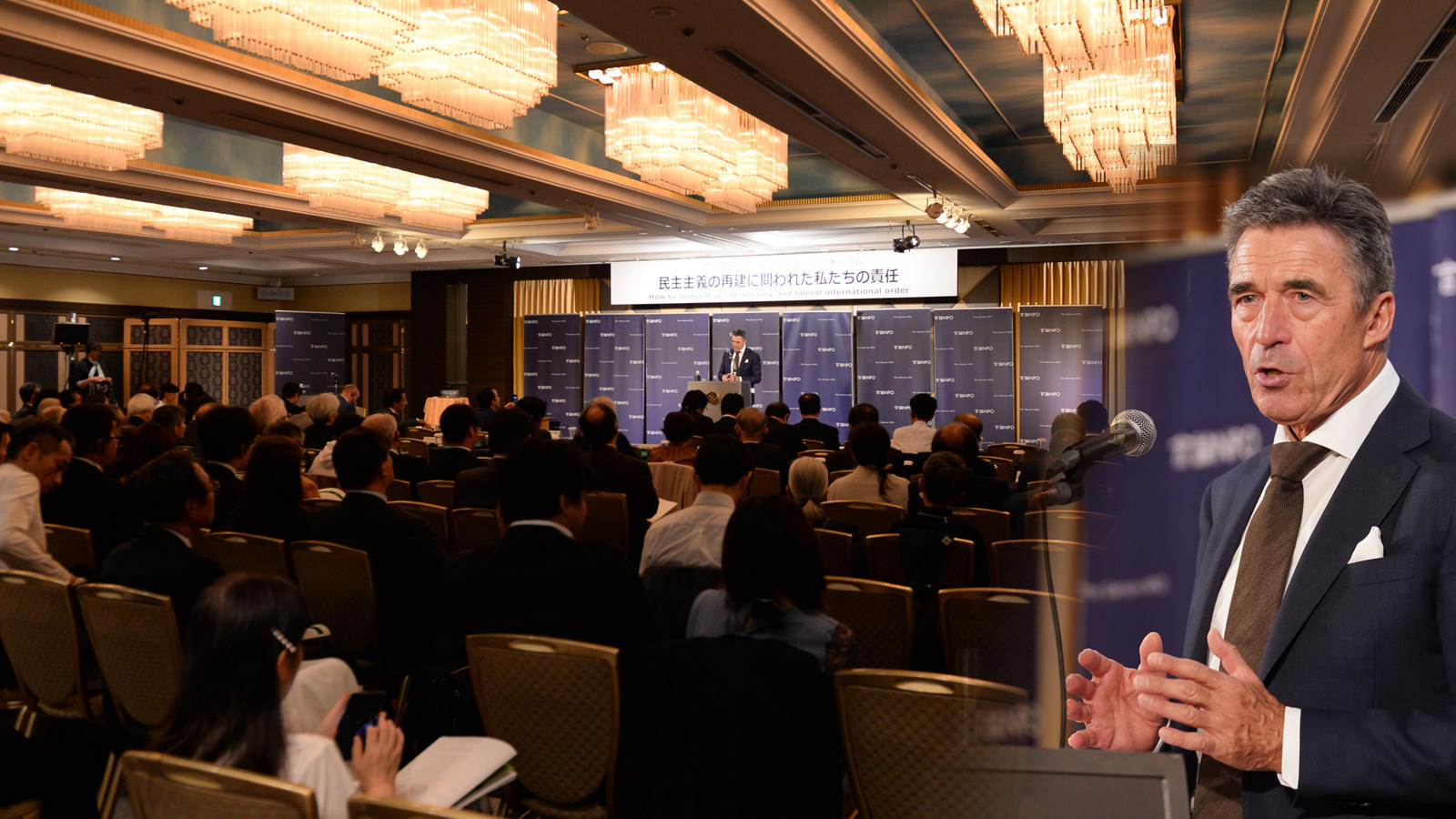
Post a comment